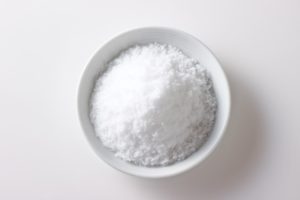 New research shows how a high-salt diet may contribute to cognitive impairment by creating chemical changes to the protein associated with Alzheimer’s disease. This is yet another reminder by healthcare professionals to regulate salt consumption.
New research shows how a high-salt diet may contribute to cognitive impairment by creating chemical changes to the protein associated with Alzheimer’s disease. This is yet another reminder by healthcare professionals to regulate salt consumption.
This new research has found that a high-salt diet could cause a deficiency of the compound nitric oxide, which is vital for maintaining vascular health in the brain. According to this new study in mice from Weill Cornell Medicine researchers, when nitric oxide levels are too low, chemical changes to the protein tau occur in the brain, contributing to dementia.
Advertisement
Published in the journal Nature, the study set out to understand the series of events that occur between salt consumption and brain function. They concluded that lowering salt intake and maintaining healthy blood vessels in the brain may help to prevent dementia. Healthy blood vessels in the brain include having a healthy level of nitric oxide, as this has been shown to affect chemical changes to the protein tau occurring in the brain. Accumulation of tau deposits has been implicated in the development of Alzheimer’s disease.
Dr. Giuseppe Faraco, an assistant professor of research in neuroscience in the Feil Family Brain and Mind Research Institute at Weill Cornell Medicine, lead the study. He spoke about the research, saying, “Our study proposes a new mechanism by which salt mediates cognitive impairment and also provides further evidence of a link between dietary habits and cognitive function.”
This research adds to some previous facts that were published last year in Nature Neuroscience by Dr. Faraco and senior author Dr. Costantino Iadecola, director of the Feil Family Brain and Mind Research Institute and the Anne Parrish Titzell Professor of Neurology at Weill Cornell Medicine.
Promoting Inflammation
This previous study found that a high-salt diet caused dementia in mice. It was concluded that the high-salt diet was causing cells in the small intestine to release the molecule interleukin-17 (IL-17), which promotes inflammation as part of the body’s immune response.
IL-17 can then enter the bloodstream, where it can prevent the cells in the walls of blood vessels feeding the brain from producing nitric oxide. This compound works by relaxing and widening the blood vessels, allowing blood to flow. On the other hand, a shortage of nitric oxide can restrict blood flow, which is what this new study is analyzing.
“We thought maybe there was something else going on here,'” Dr. Iadecola said. In their new Nature study, the investigators found that decreased nitric oxide production in blood vessels affects the stability of tau proteins in neurons. Tau provides structure to the skeletons of neurons. This cytoskeleton helps to transport materials and nutrients across neurons to support their function and health.
Advertisement
“Tau becoming unstable and coming off the cytoskeleton causes trouble,” Dr. Iadecola said, adding that tau is not supposed to be free in the cell. If tau detaches from the cytoskeleton, the protein can accumulate in the brain, which can cause cognitive problems. The researchers determined that healthy levels of nitric oxide keep tau in check. “It puts the brakes on activity caused by a series of enzymes that leads to tau disease pathology,” he said.
To further explore the importance of tau in dementia, the researchers followed up the study by giving the mice with a high-salt diet and restricted blood flow to the brain an antibody to promote tau stability. Even with restricted blood flow, researchers found normal cognition in these mice. “This demonstrated that’s what’s really causing the dementia was tau and not lack of blood flow,” Dr. Iadecola said
This research done by both studies helps to highlight how important vascular health is to the brain. As this was a study done on animals, more research is needed to analyze the connection between salt intake and cognition in humans. But for now, this study is a reminder for people to keep their salt intake in check by lowering amounts of processed foods.
